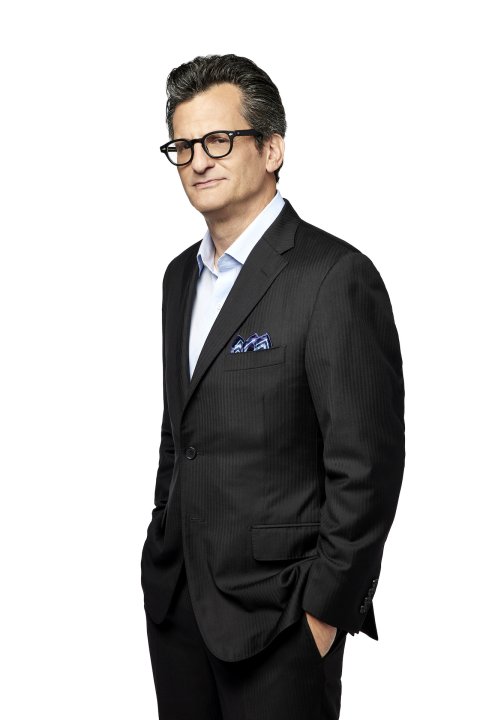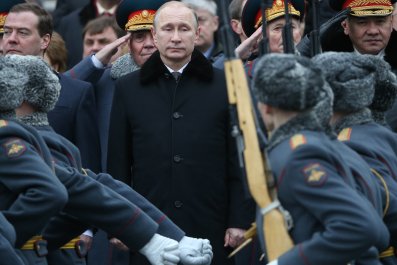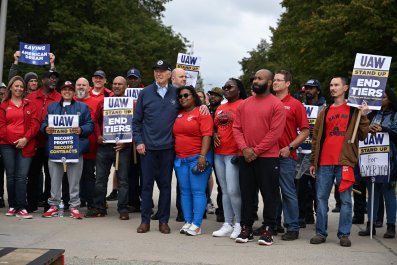
"Nostalgia is a really powerful and important emotion. It is the emotion that connects us to our past."
In 2024, the beloved cable channel Turner Classic Movies will turn 30, and for host Ben Mankiewicz—who recently celebrated his 20th anniversary at the helm—he still feels "so unbelievably fortunate to be associated with the channel." It's one of those rare networks where "it's a little bit part of your identity" and "the only channel where the channel itself matters to people." Part of the network's charm is that it taps into nostalgia. "Nostalgia is a really powerful and important emotion. It is the emotion that connects us to our past. And our past can mean so much—family, friends, school, where you were at a time of your innocence." In addition to the films, TCM offers a festival, the new podcast Talking Pictures, even a themed cruise. But for Mankiewicz, recommending just three films for newer fans of classic cinema is difficult. "I'll just give them three off the top of my head, I'd tell them to watch Casablanca, Paths of Glory and Three Days of the Condor." But he's quick to add that those movies could change depending "on the day and the mood."
SUBSCRIBE TO THE PARTING SHOT WITH H. ALAN SCOTT
ON APPLE PODCASTS OR SPOTIFY
Editor's Note: This conversation has been edited and condensed for publication.
I can't tell you how much I love TCM.
Thank you. Ninety-seven percent of the people who stop me on the street or in a store or at Starbucks or wherever, and then on the cruise where we're all together for five days, they say a version of, "Thank you." People are like, "Do you mind being stopped by people who just come up to you?" They're grateful, and some of them get emotional about it. No, [I don't]. It's beautiful. It's lovely. And it stems from a love of the movies. You talk about a great job, you talk for two minutes and then we play Casablanca. It's a job that people are gonna like you.
You're not doing much to piss 'em off.
I mean, you really have to get it wrong to make them mad. So yeah, it's lovely. It really is lovely.
There's a joke from The Golden Girls where Sophia says something about being as angry as when Ted Turner decided to colorize black-and-white films for TCM. That's the only way to make them angry.
Right. And that all still like comes from love. Like don't touch these movies. The crazy thing is, of course, Ted loves these movies more than anybody and he's such an innovator, constantly, his thought was, this will get younger people to watch these movies. So I got it, it didn't work, but that intent came from a very, very good place.
Next year TCM turns 30. Did you see your career going in the direction of being a TCM host?
Absolutely not. I just didn't. I was a journalist, and I grew up in the political wing of my family, which to me was by far the most important part. My father was a big deal in Democratic politics. In Washington, D.C., growing up, everybody who knew him thought he was the smartest guy they knew. And he was, and he was also a great dad. So politics and journalism were sort of the focus of my life. And, of course, I was aware of the accomplishments of my grandfather Herman and my great uncle Joe Mankiewicz, and Joe's kid Tom and my uncle Don and his son, John, I mean, we had a lot of writers doing well, writers and directors, [but] mostly writers. But it just wasn't that big a deal, it didn't really matter to me. It was nice, but it was like hearing that your uncle owned a bank in California and you'd be like, is he gonna leave me money? No. Well, good for him. So, "no" is the answer to your question. I could not have imagined it, and by the time I got the job I had sort of had a movie renaissance and a connection to, I hesitate even to say classic movies, but just movies. It started really in college. And I thought, I can do this job, I know a lot about classic movies. And within two days you're like, "Oh, my goodness, this fan base is so incredibly knowledgeable." I had to work hard. It's our 30th anniversary in 2024 and [2023] was my 20th anniversary at TCM. I thought it was a job, it turned into a career.
Which is often how it works.
Right? And I just feel so unbelievably fortunate to be associated with this channel and with the people who work there and to be associated with all these fans who go to the cruise, go the festival, and the people I meet, you just see what matters to them. I mean, probably to you also, it's a little bit part of your identity.
Oh, my God, it's 1,000 percent. It's how I connect with people. My Instagram is just little clips from films and TV that I connect with. It's certainly part of my identity.
It's a fact we've had people get TCM tattoos, and somebody at the festival had it painted into their hair. Can you imagine if you were meeting somebody and say, "Hey, so what do you what do you like to watch?" And they went, "Oh, my God, Showtime." You'd be like, "What?" Nobody would ever say that. Right? There are some good shows on Showtime, excellent shows on Showtime, but the channel itself doesn't mean anything, I think, certainly in entertainment, we're the only channel where the channel itself matters to people. And the people who watch it, they're unbelievably dedicated to it and very protective of it, which, of course, causes them to have very strong opinions about how we should move forward, and they don't hesitate to let us know. And overall, that's great. It's like we have a million ombudsmen, right? Every day they're making sure that we stick to our mission. I think it's great.
TCM was in the news this year when cutbacks were announced to the programming. The backlash led to Steven Spielberg, Martin Scorsese and Paul Thomas Anderson taking a leadership role in programming. I'd love to get your response to that.
I'm never surprised at the reaction of our fans to anything. First of all, I remember the reaction when I started. They were like, "What is this? He's got a goatee. He's not wearing a tie. He's not Robert Osborne. I hate it." TCM fans don't react well to change, which makes some sense because we're talking about movies that haven't changed, right? I mean, we put them in a different context every time we introduce them, that's the thing that makes us us. But I get it. I don't like change. And I don't want to celebrate the times these movies were made, they were difficult times, they were particularly difficult for large swaths of people, the playing field was particularly uneven. But [the films do] remind people of something that they saw as stable, or at least something that hasn't changed. You watch On the Waterfront and there are a whole host of things that go through your mind. One could be when you saw it, maybe you saw it with your folks, or you saw it with a friend or you took a date there. Or you just think, "My dad loved movies like this. My dad loved Marlon Brando, right?" Whatever it is. So many things that will come up for people. You can dismiss it by calling it nostalgia, which I think is sometimes dismissed, but nostalgia is a really powerful and important emotion. It is the emotion that connects us to our past. And our past can mean so much—family, friends, school, where you were at a time of your innocence. Too often we refer to the time as innocent, right? Things weren't innocent when the Black characters were written in one way. But 70 years ago, people who are 80 now, they were innocent, they were 10. So they still look at that differently. And that's why we got to remember that, that the innocence that we're talking about is frequently because people saw these movies for the first time or thought about them for the first time when they were young.
How do you hope young people discover TCM?
I mean, it is the goal of every television channel that has ever existed. How we get younger [viewers]? And those are marketing questions. I'm not dismissing it, I'm just saying, I don't really know the answer. And a lot of marketers don't know the answer, but they always try. All we can do is continue to play the leading role in presenting these great, great, great, meaningful, well-made, well-told stories, and continually try to put them in context. That's why we never repeat an introduction. That's why everything will continue to be fresh and new. [Film] is an art form that this country has been particularly great at. We're not the only ones who are great at it, but we've helped lead the way. And our job is to make sure these movies are available and easy to see and digest and then put in a modern context to understand that if you like the Marvel movies, there are [other] heroes stories, right? That informs how those stories are told, and they'll move you in the same way.
We saw that recently with the popularity of Barbie. When I saw your discussion with the Barbie director Greta Gerwig about all the classic films that influenced Barbie, it was incredible.
That was all thrown together pretty quickly. We said, "Hey, look, we want you to program a couple movies. Can you send us three or four movies that have been an influence on you?" We didn't even ask for an influence on Barbie. And she sent us a list within 24 hours of 29 movies that directly influenced Barbie. It was unbelievable.
And this discussion is impacting people in my generation, like the YouTube channel Be Kind Rewind.
She had a great little thing on Joan Crawford's Mildred Pierce. I watched it. I was like, this is so good, and so I just quoted from it.
There's also the AFI 50th anniversary special coming up, which you and TCM are taking part in.
I'm hosting the 50th anniversary. They've skipped a couple years, so it's not their 50th show, but it's the 50th anniversary of the first AFI Life Achievement Award. This special airs at the end of December. I've been to a couple of these shows, they're always really engaging, they're incredibly funny.
Nicole Kidman will be AFI's 49th honoree in 2024. What do you think Nicole Kidman's future impact will be on cinema?
I hesitate to talk about anybody's future because the playing field for who counts as a star is so much bigger than it used to be. Yet another great reason to honor old Hollywood. That said, let's not kid ourselves, if Nicole Kidman had come along in 1933, Columbia, Fox, MGM and Warner Brothers would have competed for her, she'd have been a big star, big star and she would have competed with Rhonda Fleming and Ann Sheridan for the title of the hottest redhead in Hollywood. She has a weight to her in every performance; whether the movie is for you or not, her presence in it is undeniable. She is a force, she is. It's funny, the first person who popped into my head when you brought her up was John Wayne. She's a better actor than John Wayne. He was pretty good actor, he's a super underrated actor, especially as he aged, but her presence in a movie is undeniable. She is not in the background. She comes into the room, you're paying attention to her. She's beautiful, [but] everybody in Los Angeles is beautiful. There are a lot of beautiful people who don't succeed as actors. She has a special something. She just elevates anything, and at minimum, it's going to be acceptable. And it might be amazing, right? She's gonna fit in there with [past winners] John Ford and John Wayne and Steven Spielberg and John Williams and George Lucas, Denzel Washington and all the all the greats.
I'm really excited for the Talking Pictures podcast. What can movie lovers expect from it?
Our focus is movies with filmmakers. And of course, we'll talk about their careers, but we're not focused on their careers, we're focused on why movies matter. And they're going to talk about movies that moved them, and then in the process in that context, talk about some of their own work. It comes really from a beautiful thing that Paul Thomas Anderson said, at the TCM Classic Film Festival on opening night about we're not talking about movie history, we're talking about the history of our memories. And for how so many of us, including you and me, so many of our memories are framed through movies. What we saw, when we saw it, what we felt. who we saw it with, where it was, what kind of day it was outside, right? Those stay with us. There's something special that when these stories connect emotionally, they stay with us. And the idea of this podcast is to talk to filmmakers—Mel Brooks and Nancy Meyers and a lot of other big ones that we have lined up here.
What are three starter films that you would suggest for anybody just getting started in classic films?
Well, it would definitely depend on who the person was. I'll just give them three off the top of my head, I'd tell [them] to watch Casablanca, Paths of Glory and Three Days of the Condor. If they're interested in modern media [or] if they're interested in journalism, maybe I'd tell them to watch Ace in the Hole, A Face in the Crowd and Network. I mean, there's just so many, so many wonderful, different ways to go. I could see a scenario where I tell somebody to watch Casablanca and Norma Ray.
And that was kind of a trick question, because there's no way people like you and I could ever just choose three.
There's no chance. I thought you're gonna ask me my favorite movie, and I was like, I can't. It depends on the day and the mood. I just saw for the 10th time three days, Three Days of the Condor, and I leave it every time and I think there's no movie better than that in my world. But then again, I watched Midnight Run again, and Midnight Run is a movie that played a huge role in making me recognize that I was not taking movies seriously. I think it's one of the funniest movies I've ever seen.
I can totally relate. When I was a kid I read Katharine Hepburn's memoir Me, randomly, and I became obsessed and watched all her films. I recently watched Summertime with Katharine Hepburn again and I thought, for that day, that that was my favorite movie.
That's a great answer. Because whatever happened that day you watched it, you felt great. It made you feel, I don't want to overdo it, [but it] probably made you feel seen and heard. And you instantly wanted to share that with somebody. Right? Who can I watch this with? And feel the same way. Because if you could feel that way every day, why wouldn't you do it?
Exactly, that's why I do what I do, why I work at Newsweek and host The Parting Shot podcast, just to get people as obsessed with the stuff I'm obsessed with.
You know, I'm a big Bruce Springsteen fan. And I don't care when anyone discovers [him]. Like, if you're 19 or 84, whatever, welcome. And that's how I feel about TCM. You don't have to have liked it. You get to 58 and you realize, wait a minute, some of these movies are really good. Let's go! Come aboard. Catch up. Let's share this.
Listen to H. Alan Scott on Newsweek's Parting Shot. Available on Apple Podcasts, Spotify or wherever you listen to podcasts. Twitter: @HAlanScott









